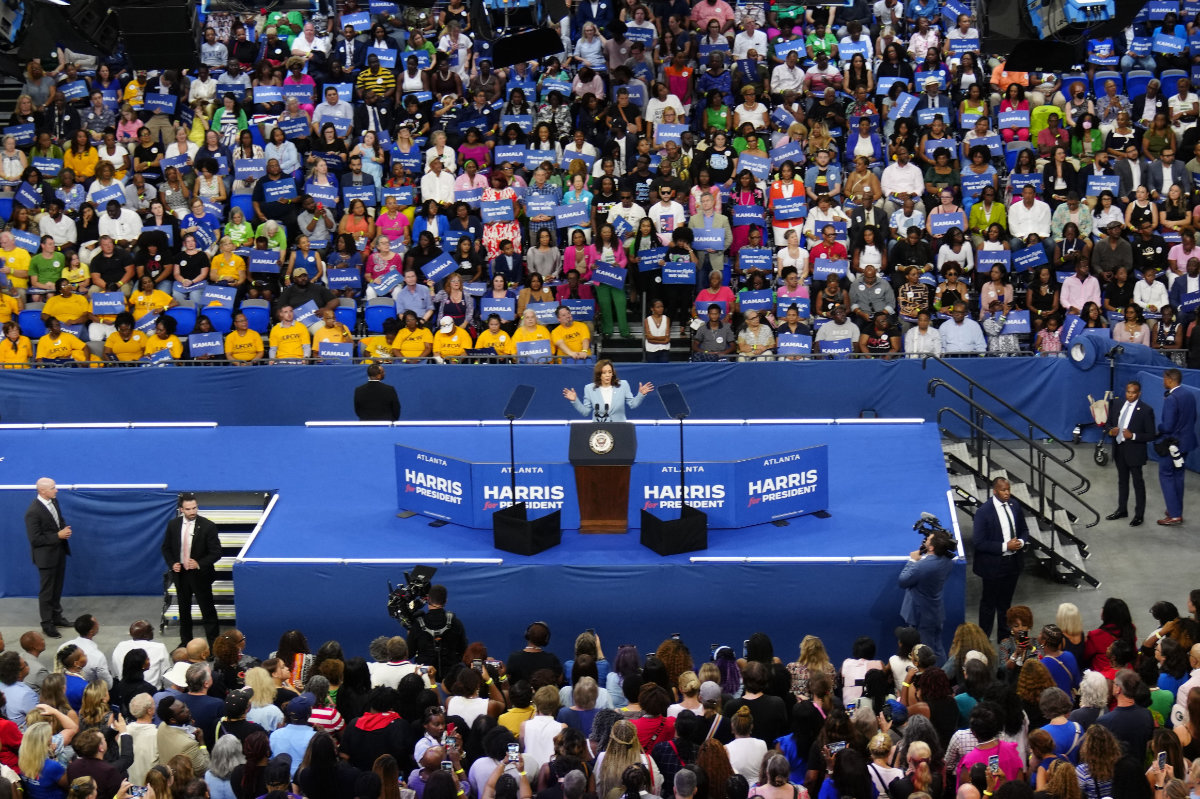WASHINGTON: A new poll confirmed Sunday that Kamala Harris — set to name her vice presidential pick imminently — has drawn level with Donald Trump, transforming a White House race that the Republican had been increasingly confident he was going to win.
As the November 5 election rapidly approaches, Harris has erased the growing lead that Trump was building before President Joe Biden dropped his reelection bid.
According to the CBS News/YouGov poll released Sunday, Harris has a one percent advantage on Trump nationwide — compared to Trump’s previous five point edge on Biden.
In the swing states that decide the Electoral College contest in US elections, Harris and Trump — who shocked the world with his 2016 presidential victory but was beaten by Biden in 2020 — are equal.
These are considered good numbers for a Democratic candidate who parachuted into the race only last month, when Biden bowed to mounting concerns over his mental acuity and ability at 81 years old to serve a second term.
But Harris, who is Biden’s vice president and the first Black and South Asian woman ever in the role, is in a sprint to define herself to voters before Trump does.
A big moment in that process will be when Harris announces her choice for running mate in a historic bid to become America’s first female president.
“It’s her first major decision that she’s making as an executive, so it tells you about her thought process,” Amy Walter, a polling expert from Cook Political Report newsletter, told CBS News.
The CBS poll, which echoes numerous other surveys indicating rapid gains by Harris, shows that Trump is still favored by voters on the key issue of the economy.
Only 25 percent said they expected to be better off financially if Harris wins, compared to 45 percent who said so about Trump.
However, when it comes to trust in the candidates’ temperament, the poll shows voters prefer the former California prosecutor to Trump, a convicted felon who has made a career out of publicly insulting those who oppose him — including while president.
The issue of cognitive health, which used to bedevil Biden, is now a liability for 78-year-old Trump, the poll found. Only 51 percent of respondents thought Trump is mentally capable for the presidency, compared to 64 percent for Harris.
The Democrats believe that if you “make this referendum on Trump rather than a referendum on the current state of the economy, then we have a real opportunity to win,” Cook said.
Trump was riding high politically last month after surviving an assassination attempt at a rally, then using the Republican convention to highlight his image of vigor against the physically frail Biden.
But with Biden’s dramatic exit and Harris’s fast start, he’s scrambling to recalibrate.
At a rally on Saturday in the swing state of Georgia, Trump called Harris a “Marxist” and a “radical left freak,” claiming she would cause an “economic crash.” On Wednesday, he shocked many when he told an audience of Black journalists that Harris had “turned Black” out of political expediency.

Vice President Kamala Harris speaks during a campaign rally on July 30, 2024, in Atlanta, Georgia. (AP)
Where Biden often attacked Trump as a threat to democracy, given his unprecedented refusal to accept his loss in 2020, Harris’s team has honed a sharper — more meme-friendly — line built around branding Trump and his vice presidential pick J.D. Vance “weird.”
On Saturday, the Harris campaign said Trump was “scared” to debate her after he turned down a previously scheduled televised debate on ABC, while saying he’d be ready to debate her on Fox News — a network that has for years given him support.
Who will she choose as runningmate?
All paths to the White House run through a handful of swing states, and Harris will kick off her five-day run Tuesday in the largest — Pennsylvania — as she builds momentum for her showdown with Republican Donald Trump on November 5.
Expectations are that Harris will pick a white man to balance the ticket — and likely a moderate Democrat who would help counterweigh attacks on Harris from Republicans that she is too far to the left.
The three figures seen as heading the short list — Minnesota Governor Tim Walz, Pennsylvania Governor Josh Shapiro and Senator Mark Kelly of Arizona — were all visiting Harris in Washington on Sunday, The Washington Post reported.
“At this moment, we face a choice between two visions for our nation: one focused on the future and the other on the past... This campaign is about people coming together, fueled by love of country, to fight for the best of who we are,” she posted on X.
Fresh from winning enough delegate votes to secure the Democratic nomination, the country’s first female, Black and South Asian vice president heads into the national convention in Chicago in two weeks in total control of her party.
In a campaign that is barely two weeks old, the 59-year-old former prosecutor has obliterated fundraising records, attracted huge crowds and dominated social media on her way to erasing the polling leads Trump had built before President Joe Biden quit the race.
Next on the agenda is a vice presidential pick, with an announcement expected any time before her rally Tuesday evening alongside the mystery nominee in Philadelphia, Pennsylvania’s largest city.
The Keystone State is the most prized real estate among the closely fought battlegrounds that decide the Electoral College system.
It is part of the “blue wall” that carried Biden to the White House in 2020, alongside Michigan and Wisconsin — two states where Harris is due to woo crowds on Wednesday.
Pennsylvania is governed by 51-year-old Democrat Shapiro, a frontrunner in the so-called “veepstakes” shortlist.
Later in the week, Harris will tour the more racially diverse Sun Belt and southern states of Arizona, Nevada, Georgia and North Carolina, as she seeks to shore up the Black and Hispanic vote that had been peeling away from the Democrats.
Just a month ago, Trump was in cruise control, having opened a significant lead in swing state polling after a dismal debate performance by Biden, with the Republican tycoon keeping the country in suspense over his own vice presidential pick.
Trump’s White House bid was upended on July 21 when 81-year-old Biden, facing growing concerns about his age and lagging polling numbers, exited the race and backed Harris.
Energetic and two decades younger than 78-year-old Trump, the vice president has made a fast start, raising $310 million in July, according to her campaign — more than double Trump’s haul.
While Biden made high-minded appeals for a return to civility and the preservation of democracy, Harris has focused on the future, making voters’ hard-fought “freedom” the touchstone of her campaign.
She and her allies have also been more aggressive than the Biden camp — mocking Trump for reneging on his commitment to a September 10 debate and characterizing the convicted felon as an elderly crook and “weird.”
While she has disavowed some of the leftist positions she took during her ill-fated 2020 primary campaign, Harris hasn’t given a wide-ranging interview since jumping into the race, and rally-goers will look for more detail on her plans for the country.
Meanwhile Trump and his Republicans have struggled to adapt to their new adversary or hone their attacks against Harris — at first messaging that she was dangerously liberal on immigration and crime, before suggesting she was lying about being Black.


























